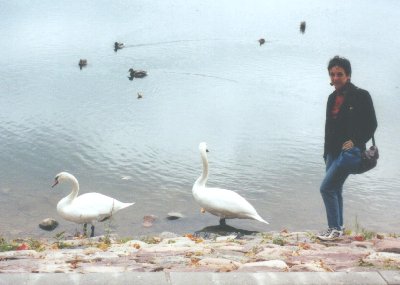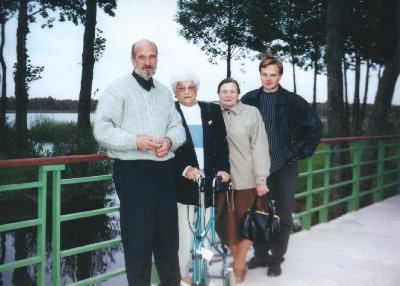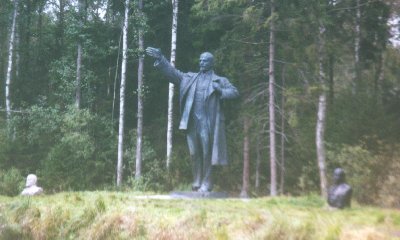|
|
|
A bit raw this morning, so I wore a turtleneck under my T-shirt and Sunday's pantyhose under my shorts. OK, so it's a bit odd, but, so's my running up and down Laisves al. There's a single-engine plane flying around the Nemunas. Wonder why.
It appears that a cute young Lithuanian woman won a gold medal in some kind of shooting. She is absolutely beaming! And the coverage than continues with other sports - not with film of her childhood, interviews with old neighbors, and all the rest that we always get. Refreshing.
After I breakfast on cheese blynai and Mom has fried eggs, Kestutis, Ona, and Dalius arrive to take us to Druskininkai, to visit Regina. Dalius got shanghaied from university and work because he speaks English and can tell me what's going on. Regina Gvazdaitiene is the daughter of Mama's older brother, Ipolitas Kancleras. He is the only member of Mama's family who lived in the U.S., but he didn't stay long.
We cross the Nemunas, pass Ona's neighborhood, and head south. Traveling through farming country that reminds me of the Vale of York in England, I see cows tethered by the road, horses plowing and pulling carts on the roadway, and people hand harvesting fall crops. Dalius explains that these are small, individual farms that have been reclaimed from the Soviet collectives. Using horses is not a sign of poverty; it is a sign of practicality. On a small farm, it isn't cost-effective to buy a tractor. The horse eats the grass that's already there, provides a variety of services, and even fertilizes the crops. Quite a different attitude.
I'm learning not to sit behind the driver. Kestutis drives like a bat out of you-know-where! I shouldn't sit where I can see the oncoming trucks when he passes. The road is narrow and windy; the shoulder is sand that spills onto the road; and there are farm wagons and bicycles. But he must know what he's doing; we survive. Betty would love riding with him - she trained in Latin America!South of Alytus, we are in the land of the Forest Brethren: the Lithuanian freedom fighters of the 40s and 50s. We stop at a roadside memorial to murdered partisans. I could swear I took a picture of this, but I cannot find it - or even a space where it failed - on my film. Darn.
Out here, in the middle of nothing but fir trees, there are bus stops along the road. Dalius explains that these are for folks going mushrooming. And we see people walking in the woods. You can go onto any private land (as long as you stay the proper distance from dwellings) to pick mushrooms, nuts, and berries because they belong to everyone. But hunters must own the property on which they hunt; so they belong to clubs that can buy sufficient chunks of land.

| Druskininkai is sort of a resort: a mineral spa set in a beautiful wooded city. After being slightly misplaced a bit, we find Regina's pretty yellow house -naturally, surrounded by gardens of food and flowers. From the metal roof, to the yellow siding, to the many-paned windows, this is what I'm coming to consider a classic Lithuanian house. | 
|
| Regina greets us and brings us in through her kitchen. What an amazing stove in the interior corner. It reminds me of the one in the PBS series 1900 House. Dalius translates for me when Regina tells that this stove was considered a joke. Until it was the only one around that functioned, because it can burn anything from coal to scrap paper. It cooks, heats water, and heats the home (because the bricks hold and emit warmth. And this is even the kind on top of which children could sleep extra warm! What efficiency. |  |
 Regina, Ona, Mom, & Roma |
We gather around the laden table in the dining room. Tea, homemade cheese (sliced, with honey - Yum), and cookies and pastry. I crochet while everyone chats. Regina's daughter Roma Gvazdaityte, who is a violinist, lives with Regina and helps hostess. We learn that during the Polish occupation of this area (when the rest of Lithuania was independent in the 20s and 30s), the family was allowed just this end of their home: the Polish authorities appropriated the rest for offices. It's amazing that Lithuanians are so friendly and gracious, after everything they have suffered. And just during the lives of these relatives - never mind historically. |
Kestutis and Dalius decide we should let the girls chat while they show me around Druskininkai. And I'm always game for a walk.
| Following along lanes and paths, we go through a park along the Nemunas, heading to the fancy spas and mineral baths. The grassy swaths, groves of old trees, flower beds, and ornate buildings are so much like Sartatoga Springs that I again feel Lithuania and the U.S. must be within driving distance. I don't feel foreign, even though I cannot understand conversations. Then, I spot a huge woodpecker with a yellow-green back. Guess I'm not at home! But the Nemunas is so wide and calm and lovely, I could make this home. |  Kestutis & Dalius - and the Nemunas (oops, in shadows) |
 |
Up into the town, past hotels, a church that's closed (vandalism travels everywhere), a museum to Ciurlionis (an artist and composer), and a modern statue of Vytautas. He is a major symbol of Lithuania. Another is the tauras, a non-extinct wild bull that once wandered the area. We return past a large pond - with swans! Dalius captures me harassing these big birds. The ducks keep a safe distance. |
Back at Regina's, we have some more tea and share photos. In talking about squirrels, I discover that we had the wrong name for the dog that went up in Sputnik (which inspired Sandy and me to start the Room 6 Weekly newspaper in 6th grade). We Americans have always believed the dog's name was Laika. Wrong; that's the breed (Husky). And there were two dogs: Strelka (Arrow), who was exiled to space, and Belka (Squirrel), who was back-up. Then it's time to head back to Kaunas. With a bag of Regina's antininis apples. I'm glad we're getting lots of these; they are sort of sweet and tart and light and juicy. Unlike any apples I've had before. And I love snacking on fruit!
But on the way, we visit Grutus. In a little village, a man has collected as many old Soviet statues as he can get: not in honor of the Soviets, but to keep alive the memory of what oppression is. The plaques along the trail tell of suppression, oppression, collaboration, distorted history... forcing "reality" to follow the party line. I can't imagine having to face monuments to those who prevent me from being me, who murder patriots, who exile anyone who might lead my country back to its identity.
Dalius and I spot some large cages off to the side of the trail. And discover a little sort of nascent zoo. I pat a little deer (or elk?) and get to see boar "up close and personal". Whew - and they tell me this guys run loose in the woods! Dalius plays with a cage full of hysterically acrobatic playful weasels - and lets them nibble on his fingers with their blunt teeth. On the way back to the trail, the guys pick me a mushroom. It's brown and smooth - and safe. The forests where these grow is fir, but with a spongy mossy floor instead of sticks and scrub brush.
 Kestutis, Mom, Ona, & Dalius on the bridge into Grutus Park. Again, the "hot rod" earned it's keep as Mom walked the whole trail with Ona. |
 The statue of Lenin from Vilnius. This is what all the news reports showed getting toppled with a crane. Like all Soviet sculpture, it has that weird perspective; the part closest to the viewer is the largest, which is the reverse of logic. Metaphor for their rule? |
It's chilly, and getting late. The car heater quickly thaws us out, as we drive past small villages. We do pause to see a statue of Vytautas that survived the Soviet purges. They systematically destroyed everything that Lithuanians could look to to honor their heritage and identity. Knocking down statues, discouraging the use of Lithuanian, insisting the Soviets "rescued" Lithuania from backward ways. Gee, sounds sort of like what we did to the Native Americans. Isn't it sad what humans do to each other? Makes calling someone and "animal" more of a compliment than an insult. Anyhow, here in Perloja, the villagers defended this statue of the last Lithuanian Grand Duke.
 |
The inscription on the back says something like, "Vytautas the Great! While there is any Lithuanian to honor you, you are honored." |
 |
We drive back through small villages and the pine forests where Kestutis's family picks mushrooms. As evening arrives, farmers go out to their tethered cows, with a stool and a pail to milk them where they stand. Dalius tells me that Lithuania is trying to maintain (and expand) the social benefits they had under the Soviets. Students with good grades attend university for free - good incentive - for example. But the capitalist economy isn't producing sufficient funds yet. Many older workers (my age and up) were probably better off economically before; the pension changes remind me of IBM's and have the same effect. And there aren't enough good jobs for university graduates, so many are emigrating.
Interesting aside. Dalius actually took a class about how to deal with foreigners, especially in international business. On of the big points was that Lithuanians have to learn about "personal space". They don't seem to need any; they are always up close in conversations, walk down the street touching shoulders, and pass on the sidewalk so close I initially worried about pickpockets. But they are discovering that others, such as Americans, need lots of space around them in personal dealings. So one of the things this class taught was that, no you don't have bad breath or hygiene, you're just too close. It would help if someone warned Americans that Lithuanians aren't getting fresh or dangerous, they just like to be close.
On through the resort of Birstonas, and a side trip to Prienai, which is practically encircled by the Nemunas, and back to Kaunas. We drop Ona at her house and go to Kestutis's apartment. It's not large, but is well-designed and comfortable. As at Jonas and Janina's house, the hall wallpaper is patterned like the ones in English pubs, but it's sort of padded. I get my "puppy fix" scritching and getting kissed by their dog, which looks like a short, longer-legged, wire-haired daschund. Aldona and Rasa join us and we all go down and pile into the car to Prie Svustykliu for dinner.
What a lovely evening. Delicious pork with lots of fresh and sautéed veggies (and good beer). Mom talks with the parents; I gab with the kids. Rasa is far better at English than she gives herself credit for. I can't imagine enjoying myself so much with kids the same age at home. They'd sulk or talk only of dates and music. Maybe it's that we are lost-then-found family and they are being especially solicitous of us old folks. But I think European kids are just more sophisticated (which I hope they don't consider and insult!).
On the way back to Monela, we cross the Nemunas and drive up a dirt road to a hilltop. Wow! What a gorgeous view of the lights of Kaunas. And all the cars appear to hold adults and families - not teens out necking. Culture shock. Kaunas is huge and beautiful.
We were out for over 12 hours! We may be tired, but we've had a great day. The countryside is beautiful; and the people seem to enjoy and love the land. By our standards, they might be poor (plowing with horses, hand-milking cows, even picking mushrooms and growing their own food) but they seem to have better lives and enjoy them more than we do. I feel I've connected so much more to my grandparents. And I always felt close to them. Guess my Lithuanian genes are dominant.
Back to the Lithuania Journal Page
Back to Nancy's Home Page
Back to the Ciaffone Family Home Page